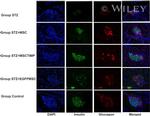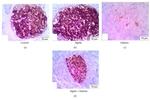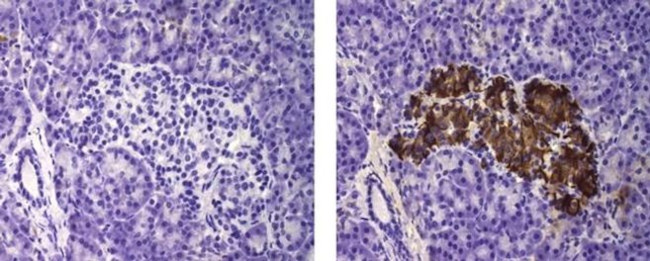Search Thermo Fisher Scientific
Invitrogen
Insulin Monoclonal Antibody (ICBTACLS), eBioscience™
FIGURE: 1 / 3
Insulin Antibody (14-9769-82) in IHC (P)



Product Details
14-9769-82
Species Reactivity
Published species
Host/Isotype
Class
Type
Clone
Conjugate
Form
Concentration
Purification
Storage buffer
Contains
Storage conditions
Shipping conditions
RRID
Product Specific Information
Description: This ICBTACLS monoclonal antibody reacts with the hormone insulin, responsible for regulation of carbohydrate and fat metabolism. Blood glucose levels are maintained by insulin. Insulin secretion from pancreatic beta-cells within the islets of Langerhans results in uptake of excess glucose from the blood into organs and its storage in the form of glycogen. Patients with type 1 diabetes have an autoimmune destruction of insulin-producing beta-cells in the pancreas, resulting in insulin deficiency and elevated levels of blood glucose. Patients with type 2 diabetes have insulin resistance where insulin becomes less effective at reducing the amount of blood glucose. Insulin is also important for proper endothelial cell function in with respect to vascular elasticity in response to changing blood pressure and plays a role in cognition, learning, and memory.
The ICBTACLS antibody recognizes human, mouse, and rat insulin.
Applications Reported: This ICBTACLS antibody has been reported for use in western blotting, immunohistochemical staining of formalin-fixed paraffin embedded tissue sections, and microscopy.
Applications Tested: This ICBTACLS antibody has been tested by immunohistochemistry of formalin-fixed paraffin embedded tissue using low or high pH antigen retrieval and can be used at less than or equal to 0.25 µg/mL. This ICBTACLS antibody has been tested by western blot of non-reduced pancreatic tissue lysate and can be used at less than or equal to 5 µg/mL. It is recommended that the antibody be carefully titrated for optimal performance in the assay of interest.
Purity: Greater than 90%, as determined by SDS-PAGE.
Aggregation: Less than 10%, as determined by HPLC.
Filtration: 0.2 µm post-manufacturing filtered.
Target Information
Insulin is a peptide hormone secreted by beta cells of the pancreatic islets. It regulates carbohydrate, protein and lipid metabolism by enhancing membrane transport of glucose, amino acids, and certain ions. It also promotes glycogen storage, formation of triglycerides and synthesis of proteins and nucleic acids. Insulin is 51-amino acid polypeptide product produced from a precursor peptide, proinsulin. Proinsulin is post-translationally cleaved into two chains (peptide A and peptide B) that are covalently linked via two disulfide bonds and one molecule of C-peptide. Insulin deficiency results in diabetes mellitus, one of the leading causes of morbidity and mortality in the general population. Insulin is also present in tumors of b-cell origin such as insulinoma.
For Research Use Only. Not for use in diagnostic procedures. Not for resale without express authorization.
Bioinformatics
Protein Aliases: Ins; Insulin; Insulin-1; Insulin-2; preproinsulin; proinsulin
Gene Aliases: AA986540; IDDM; IDDM1; IDDM2; ILPR; INS; Ins-1; Ins-2; Ins1; Ins2; Ins2-rs1; InsII; IRDN; Mody; MODY10; Mody4; proinsulin
UniProt ID: (Human) P01308, (Rat) P01322, (Mouse) P01325, (Rat) P01323, (Mouse) P01326
Entrez Gene ID: (Human) 3630, (Rat) 24505, (Mouse) 16333, (Rat) 24506, (Mouse) 16334

Performance Guarantee
If an Invitrogen™ antibody doesn't perform as described on our website or datasheet,we'll replace the product at no cost to you, or provide you with a credit for a future purchase.*
Learn more
We're here to help
Get expert recommendations for common problems or connect directly with an on staff expert for technical assistance related to applications, equipment and general product use.
Contact tech support
